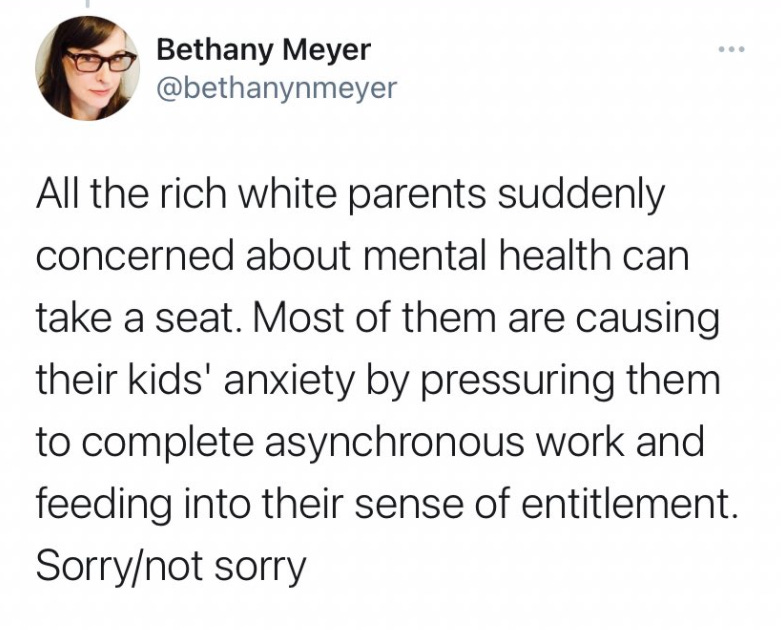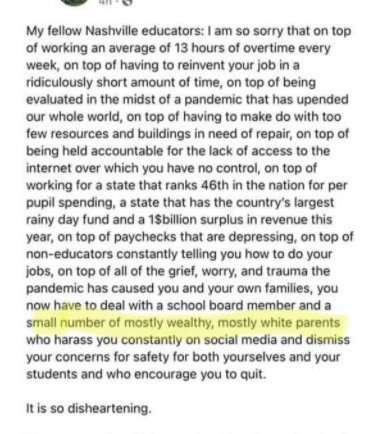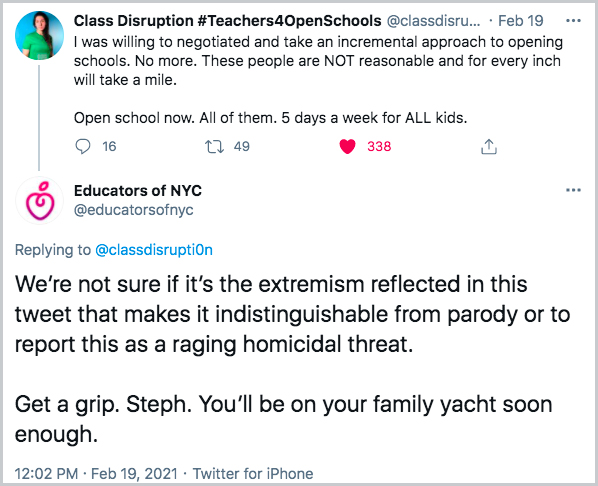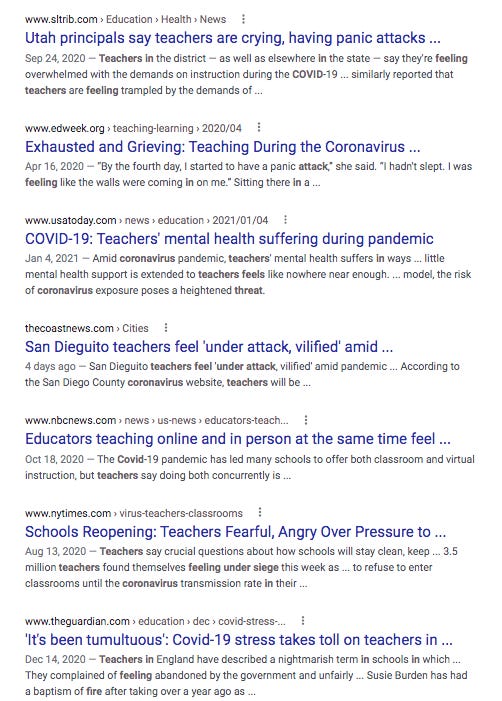Erika Sanzi: Parent-Shaming Is Nothing New, But the Pandemic and the Ugly School Reopening Showdown Has Put It On Display In Ways It Never Has Been Before
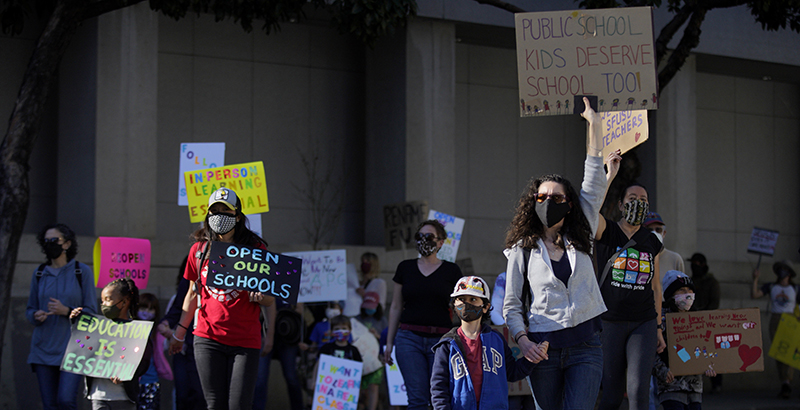
This essay originally appeared at Sanzi Says.
Parent shaming by school officials is nothing new but the pandemic has brought it into public view more than ever before. I have a unique lens on this because I worked in schools for a decade, served a term on an elected school board and am currently the parent of three school-aged children. In my education advocacy, I regularly talk to lots of parents from all different places with a range of experiences. My own record on the parent-shaming front is hardly spotless—of that I am sure. I don’t have memories of anything egregious but common sense tells me that in a moment of frustration after a terrible meeting or phone call with a student’s parents, I probably made an overly broad and unfair comment. But the ire and insult directed at parents as a whole in the midst of COVID and the school reopening conversation is something to behold and it feels like it is coming from every direction at once.
Anyone who has worked in a school knows that the teachers lounge is often abuzz with tales of the worst parents ever. It could be that a parent is totally checked out or one of those helicopter types —either way, it can quickly devolve from “this parent” to “all parents” and that is never an effective or productive way to engage on complex and important topics like how to get children who have been out of school for 11 months back into school.
An entire school board in Oakley, California quickly resigned after a live video stream of them belittling parents went viral—they thought they were just talking amongst themselves before a meeting.
“They want their babysitters back.”
“Bitch, if you are going to call me out, I am going to f*** you up.”
One member said that his brother delivers for a medical marijuana service that— “when you got your kids at home,” he said, “no more smoking out.”
They enjoyed a hearty laugh. Until they discovered that they were not, in fact, alone and that their gripe session was being broadcast live. (Watch the meeting footage that led to the resignations)
Lots of people have expressed “shock” over this story. I was not shocked at all. This is not new—they just got caught this time on hot mics. I am sure that they have found themselves on the receiving end of some angry parent emails and phone calls that have crossed the line—welcome to public service. And parents certainly have every reason to be furious that they continue to pay the same amount in taxes for schools that have not been open since March of 2020 while more than half the country has had access to in-person schools for five months.
The anonymous person who recorded the now infamous 8 minutes of video put it simply when they expressed their desire “for our local public school to be run by better people.” Each of these board members is obviously more than this one, now very public, misdeed. It is Bryan Stevenson who said that “each of us is more than the worst thing we have ever done.” But I suspect these board members learned a valuable lesson about how wrong and unfunny it is to speak callously about a whole group of people, especially during a time that has been so trying for so many of the students and parents they were elected to represent.
Across the country in Alexandria, Virginia, a school board member stunned people with what she said at virtual board meeting in January that she knew was being live-streamed. She said that parents who are “reading research that says schools are not transmitting agencies [of COVID] are definitely in another frame of mind” and then asked those same parents, rhetorically, “do you want your child to be alive, or educated?”
Hmm. Seems to me the right answer to that ridiculous questions is, “both, please.”
Moving on from school boards, let’s look at a Chicago science teacher’s contribution to the parent-shaming frenzy. This teacher is not speaking on behalf of the union—we’ll get to them next—but as an individual educator who felt compelled to write about his disdain for white parents who think schools should be open.
Here is an excerpt from his piece:
“Teaching and learning are my passions. But in-person school while the pandemic continues to rage unchecked makes no sense. As a parent, I am terrified for the life of my child. As a teacher, I fear for my own life and the lives of my students and their families. I can’t teach from the grave, nor can kids learn from there. If we do not speak up, nice white parents will get us killed.”
Keep in mind that Mike Friedberg wrote this in January, after more than half the schools in the country were already offering in-person learning to their students. His inflammatory and racially charged invective ignores places like Providence, Rhode Island where 70 percent of parents opted for in-person learning in the fall—the city is only 9 percent white. In Detroit, a city that is 82 percent Black, between 40 and 50 percent of parents prefer to send their children back to school. Friedberg’s piece feels like a cudgel designed to intimidate white parents who prefer in-person learning into silence, lest they be called ‘racist killers’ by people like him. I suspect this messaging may also serve to silence Black and brown parents who want their children to return to school but feel pressure to be against it.
Here’s another similar take:
As we have watched teen suicide literally surge from Las Vegas to Charleston, South Carolina, parents are being told to “take a seat” when they raise concerns about the impact school closures seem to having on the mental health of many students.
Now, it is absolutely true and vital to mention that polling has consistently shown Black and brown parents are less comfortable sending their children back to school in-person. Many cite the high percentage of COVID deaths in their communities as well as their distrust of the school system long before the pandemic. They are also less likely to say they’ll get the vaccine. But baked into all the numbers about COVID and school are Black and brown parents who do prefer their children to return in-person and white parents who do not. Same goes for all other demographic groups. Are we to dismiss them because they don’t align with the majority of people in their racial category? I refuse to do that.
For helpful reference, here’s a look at how parent preference breaks down in DC Public schools:
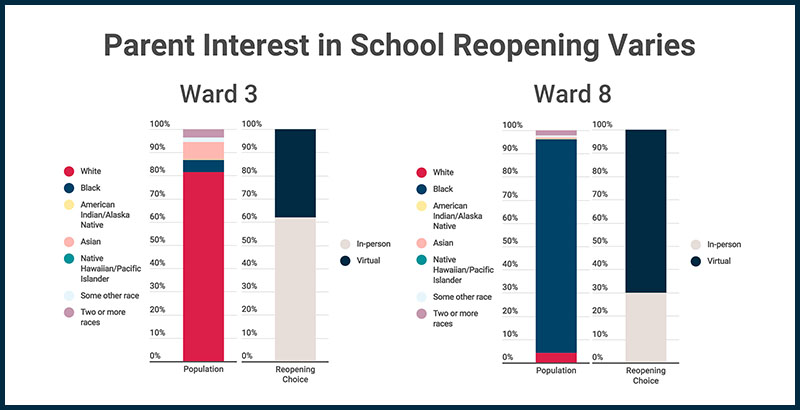
For more reference, here is an important reminder:
There is also a tendency to focus on the disproportionate # of white families relative to the overall number, but the fact is still true that the *majority* of families choosing in-person in urban districts are not white.
Removing the choice of in-person is not the answer.— NYC Angry Mom – #OpenSchools (@angrybklynmom) January 31, 2021
Because of these sizable swings in comfort levels among parents of all races and income levels, schools need to offer options that include in-person and remote learning, at least for the foreseeable future. But it is wrong, on every level, to smear and shame anyone because of their preference. It is doubly wrong to attribute their preference to their race (or any other immutable characteristic, for that matter.)
Speaking of smearing parents, perhaps no one is better at it than the teachers’ unions— it is a tried and true part of their playbook. (Reminder that I was in two NEA affiliated teachers’ unions in two states.) Until COVID hit, the parents who inevitably found themselves on the unions’ enemies list were homeschoolers and outspoken advocates for school choice. Early on in the school closures, parent-pods and micro-schools were the new bad guys. But as parents — including lifelong Democrats and union loyalists—increasingly understand the science and demand an in-person option for their children, they too have become the enemy that “doesn’t care if teachers die” and “can’t stand to be with their own kids.” The rhetoric being weaponized against parents is demeaning, unfounded and usually flies in the face of what the science tells us about COVID and schools.
Nearly 140 teachers in Pasco, Washington signed a letter in support of their union president after he said, during a public meeting in January, that parents who want schools to open are showing their white privilege. His sentiments have been echoed far and wide. (The superintendent in Evanston, Illinois also accused parents of white supremacy for questioning his leadership for keeping schools closed.)
In the Metropolitan Nashville Public Schools, a district that is exceptionally diverse, 55 percent of families surveyed in December said they wanted to return to in-person schooling for second semester—here’s how the union president portrays them in a message to her members:
The district is only 28 percent white and the survey was given at the height of the surge and before the vaccine was available to anyone.
In addition to the racial rhetoric, union chapters and “social justice” organizations across the country have joined forces to link anyone who supports opening schools to Trump and the Republican Party.
“I still get called a granny killer,’ says Maya Ziobro, a parent who supports reopening. ‘If we say anything about wanting our kids to return to school, we’re painted as Trumpers.”
This phenomenon is playing out in Montclair and Maplewood, NJ even though most parents there are self-described progressives. The American Federation of Teachers (and their fearless leader, Randi Weingarten) accuses people who support reopening of parroting “Republican talking points” and being pawns of the GOP. Let’s ponder how dishonest and absurd that is since it’s the bluest and most progressive cities and towns where schools remain closed—most parents in those places are hardly right wingers. Many of them are, however, very honed in on the science of virus transmission in schools and find themselves a bit gobsmacked that they spend so much of their time arguing with teachers. Julie Fry, an outspoken reopening advocate from Maplewood says that some of the most vehement attacks she was getting on Facebook were from people who identified themselves as teachers.
“I couldn’t believe it. I was arguing with teachers about the importance of education.”
When a New York City mom called out UFT president Michael Mulgrew, one cruel and anonymous person on Twitter responded this way: (Note: ACS refers to the Administration For Child Services.)
After being called “jerks” by a regional head of the Pennsylvania State Education Association, some local moms ran with it and JERK became Just Educate ouR Kids. I kind of love that they did that.
The union ugliness goes far beyond these local chapters—the American Federation of Teachers has been working full time to make the ridiculous case that the push to reopen schools is a Republican conspiracy to put people in danger (well, when they aren’t eating crumpets at the White House with the First Lady and helping to write the CDC guidance!)
And then there are the anonymous, profanity laced emails that flood the inboxes of outspoken reopening advocates.
Here is a White House official—he wrote this on Twitter before being tapped for the Biden team’s COVID-19 task force. Some would have considered this disqualifying.
Some people want their kids back at school to get an education but I think others don’t want to be around their kids all day long. They have more passion for the issue.
— Andy Slavitt @ ??? (@ASlavitt) July 29, 2020
When reopening advocates (who are also parents) highlight the countless teachers who are bravely bucking their unions and publicly calling for schools to reopen, they find themselves on the receiving end of this:
Do you realize if you weren’t so obsessed with schools you would be a much better mother. Teachers didn’t start the coronavirus. What would it take for you to be a little more of a mother to read a book with your child.
— Mike (@IDontrustBiden) January 21, 2021
And when a teacher goes to the mat for reopening, she is met with this:
Before I wrap up what has become a much longer and more involved piece than expected because of the huge outpouring of responses I got when I asked for examples of parent-shaming, I want to address something important:
The teachers who find themselves being smeared and shamed online and elsewhere.
While much of the vitriol coming at parents is from teachers, there are also countless teachers — the majority, I suspect—who haven’t shamed anyone, are working hard under difficult conditions and feel increasingly under attack.
Let me say this clearly—the teacher bashing happening right now is wrong and often grotesque. But it has also gotten a ton of coverage. A quick google search brings up a boatload of pieces about teachers.
While plenty of the blowback teachers as a group are receiving is fair and reasonable considering the context of nearly a year of shuttered schools, the name calling and personal insults that are ubiquitous on Twitter and Facebook are disgraceful. And counterproductive. One crucial point that seems misunderstood and often overlooked is the crucial distinction between rank- and- file teachers and their unions. It would probably surprise some readers to know how disgusted and dismayed many teachers are at the tactics being employed by their unions.
Just as it is always wrong to paint parents with a broad brush, it is equally wrong to do that to teachers—there are 3.2 million of them in this country. For those who say, ‘yeah but I know this teacher who has said and done really bad stuff”, my response is “don’t we all?” Teachers are human beings and some do and say bad stuff. So do some parents. So do members of every group.
If we are to effectively call out bad behavior in the school reopening debate—or any debate—we need to be precise about who we are talking about. Otherwise an unhealthy us vs. them dynamic emerges that is inevitably riddled with misunderstanding and resentment.
I have long believed it to be wrong to limit the educational options for children to their residential address. There is no one school or school model that can possibly serve all children well. COVID has shone a very bright light on why every parent, regardless of income or zip code, is worthy of the self-determination that comes with having options. Parents who have long needed an escape hatch from their residentially assigned schools are used to being shamed and bumping into brick walls when it comes to educating their children. But for many parents of means who bought their homes for the schools, the impact of COVID has been their first real brick wall—they know what they want and need for their children and are being smeared and shamed when they ask for it.
If there is any silver lining to all this ugliness, it just may be that parents who always had access to what they wanted for their children will better understand what parents with less have endured for generations. Perhaps, even when the COVID crisis is in the rear view mirror, they will turn that empathy into action and advocate for all parents to have access to schools that work for their children.
This essay originally appeared at Sanzi Says; subscribe to Erika Sanzi’s Substack.
Get stories like these delivered straight to your inbox. Sign up for The 74 Newsletter

;)
